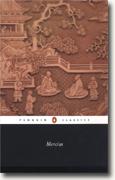Anonymous, trans. D.C. Lau
book reviews:
· general fiction
· chick lit/romance
· sci-fi/fantasy
· graphic novels
· nonfiction
· audio books
· author interviews
· children's books @
curledupkids.com
· DVD reviews @
curledupdvd.com
newsletter
win books
buy online
links
home
for authors
& publishers
for reviewers

 |
Mencius Mencius, trans. D.C. Lau Penguin Classics Paperback 304 pages June 2005 |
|
Meng Ke, whom we know in the West by his Latinized name, Mencius, was a wandering sage who taught widely and advised the rulers of the state of Qi during the Warring States Period (403-221 BC). Mencius himself lived from about 370-290 BC, having been born just a few miles from the only other philosopher know in the West by a latinized name, Confucius, who lived about a century before Mencius. Towards the end of his life Mencius despaired at the possibility of effecting change in government and so retired from public life.
It’s hard work to be a good person: “Slight is the difference between man and the brutes,” Mencius says. “The common man loses this distinguishing feature, while the gentleman retains it.” To the modern reader the category of “common man” and “gentleman” may be somewhat offensive, but the classist distinction is historically accurate. More importantly, though, the difference might be better described as that between a “bad” man (“the brute”) and a “good” man (“the gentleman”). The book ascribed to Mencius, and which bears his name as its title, makes for wonderful reading as it is composed of philosophical vignettes, each related as a tiny story, usually about an encounter and conversation with a king or other nobleman. Here’s a sample: After seeing King Xiang of Liang, Mencius said to someone, “When I saw him from a distance he did not look like a ruler, and when I got closer, I saw nothing to command respect. But he asked ‘How can the realm be settled?’ I answered, ‘It can be settled through unity.’ ‘Who can unify it?’ he asked. I answered, ‘Someone not fond of killing people.’ ‘Who could give it to him?’ I answered ‘Everyone in the world will give it to him. Your .Majesty knows what rice plants are? If there is a drought in the seventh and eighth months, the plants wither, but if moisture collects in the sky and forms clouds and rain falls in torrents, plants suddenly revive. This is the way it is; no one can stop the process. In the world today there are no rulers disinclined toward killing. If there were a ruler who did not like to kill people, everyone in the world would crane their necks to catch sight of him. This is really true. The people would flow toward him the way water flows down. No one would be able to repress them.’”Mencius employs both the parable and the Socratic method (the question-and-answer exploration of an ethical or political problem) to great effect. His bite-sized morsels are easy to read but provide much nourishment for thought. There are many parallels to Western philosophy to be found in Mencius (such as the idea that the people may overthrow a corrupt government, something Americans should more frequently remember is enshrined in their Constitution) as well as striking parallels. Chinese philosophy in general, for instance, was never particularly burdened with the great logical indignity of dualism (the idea that the mind or soul and the body are two separate entities). Lau’s fluid translation (first published by Penguin in 1970 and presented here in a revised version edited in collaboration with scholars at the Chinese University) is complimented by an appropriately windy and academic introduction in which he thoroughly situates Mencius within the context of Chinese philosophy and draws the big picture that is the Confucian-Mencian system. © 2005 by Brian Charles Clark for curledup.com. |
|
|
|
 Click here to learn more about this month's sponsor! |
|
| fiction · sf/f · comic books · nonfiction · audio newsletter · free book contest · buy books online review index · links · · authors & publishers reviewers |
|
| site by ELBO Computing Resources, Inc. | |
 The basis of Mencius’s philosophy is the assertion that all humans are basically good. It is society’s influence that causes good people to do bad things. This immediately raises a question: What is society composed of if not people? The answer is nowhere specific, but the cumulative impression is that the reason society can be a bad influence on individuals is habit. The analogy in Western logic might be the concept of “the slippery slope.” One person slips from his moral obligation toward the good and soon everyone around him is, too. Or, to put this idea another way: One dog barks and they all join in.
The basis of Mencius’s philosophy is the assertion that all humans are basically good. It is society’s influence that causes good people to do bad things. This immediately raises a question: What is society composed of if not people? The answer is nowhere specific, but the cumulative impression is that the reason society can be a bad influence on individuals is habit. The analogy in Western logic might be the concept of “the slippery slope.” One person slips from his moral obligation toward the good and soon everyone around him is, too. Or, to put this idea another way: One dog barks and they all join in.